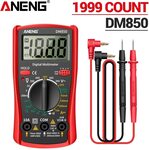you need to click through this link to get the reduced price - otherwise ~$10 delivered.
I needed a multimeter with Audible Continuity Test. this multimeter ticks that box.
This instrument is a compact pocket-sized digital multimeter for measuring AC&DC voltage,DC Current,Resistance and Diode.Also provide Temperature,audible continuity test function or can be used as single generator.Full range overload protection and low battery indication are provided.They are the ideal instrument for use in fields,such as laboratory,workshop,DIYers,and the home applications.
Package:
1Multimeter
1test leads
1manual
1outer packing box






Any good?